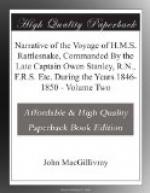June 13.
On our mustering this morning, Carpenter was missed from the camp. It was discovered that he had absconded during the night, carrying off with him a damper weighing about eleven pounds, two pounds of tea, and ten pounds of sugar. We had breakfast as quickly as possible, and Mr. Kennedy sent four men on horseback to scour the country around in search of him. They returned from an unsuccessful search, but had received intelligence from the blacks that he was not far off.
June 14.
A party went out early this morning, in search of Carpenter, and caught sight of him about two miles from the river, sharing his damper with the blacks. As soon, however, as he saw the party approaching, he decamped into the bush, and was again lost sight of. On coming up to the spot where he was seen, the bags in which he had carried away the tea and sugar were found; the sugar was nearly consumed, but the tea appeared untouched. In the evening Carpenter returned, and on begging Mr. Kennedy’s pardon, he was forgiven. Throughout the expedition he was of very little service, being, in fact, little better than an idiot.
This evening we saw a large alligator, about twenty feet long, rising to the surface of the water, close to our camp. He appeared to be attentively watching our sheep, which were feeding by the side of the river, on the Dolichos and Ipomoeas which were growing on the sand. The natives here had a great many dogs, which, towards evening, rushed on our sheep and drove them among the bushes in all directions. We had great difficulty in getting them together before dark.
June 15.
We proceeded inland two or three miles to the edge of the freshwater swamps, and camped there. Mr. Kennedy went with a party into the swamps to ascertain if it were possible to make a road for the carts to pass through. Wall and myself went out collecting specimens.
I found a beautiful species of Loranthus, growing on acacia trees, and producing on its long pendulous shoots abundance of beautiful scarlet flowers; the tube of the corolla was two inches long, with a very short limb, and the plant has lanceolate, glossy leaves. This most interesting parasite—covering the acacia trees—when in flower forms a most gorgeous sight; presenting a beautiful contrast to the dull foliage of the surrounding trees. I also found a scarlet passionflower,* very beautiful, with three-lobed glaucous leaves; and a Nymphaea, (waterlily) growing in the waterholes and small creeks, producing large purple flowers, and peltate leaves; besides a number of other new and interesting plants. Mr. Wall succeeded in obtaining a specimen of a beautiful little marsupial animal, resembling an opossum in form, but not larger than the common rat, the colour pure white, with very small black spots.
(Footnote. Disemma coccinea. See Volume 1.)
Mr. Kennedy and party returned in the evening, after having been in the water up to their knees all day. He reported that it was altogether impossible to make a road.




